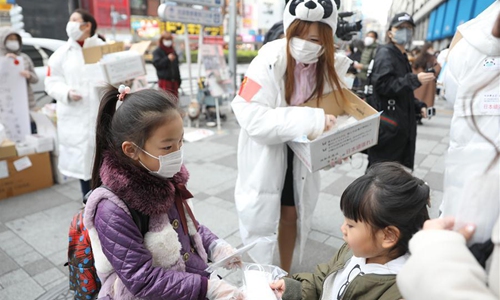HOME >> WORLD
Chinese in Japan live under threat of virus, witness enhanced ties
By Sun Haoran Source:Global Times Published: 2020/3/10 19:46:53

Members of a volunteer group named "Mask Panda Action Team" hand out masks to local people in Tokyo, Japan, Feb. 29, 2020. Members of the "Mask Panda Action Team", a volunteer group initiated by local Chinese community and later joined by more people in Japan, distributed free masks to local people on Saturday to help with the prevention of the novel coronavirus disease. (Xinhua/Du Xiaoyi)
Many Chinese people living in Japan said their lives have been affected by the spread of COVID-19, with experts noting that Chinese-Japanese relations are getting closer during their cooperation in combatting the epidemic.
Japan has become one of the most severely hit countries outside China in terms of COVID-19 infection. More than 1,200 people in the East Asian country (including 696 passengers from the Diamond Princess cruise ship) have been confirmed infected with a death toll of 17 as of Tuesday.
Japan's Cabinet on Tuesday approved a bill that would enable Prime Minister Shinzo Abe to declare a state of emergency, if needed, as Japan scrambles to curb coronavirus infections, the Japan Times reported.
The Japanese government implemented tighter border control measures on Monday for travelers from China and South Korea, effectively banning tourists from the two countries through to the end of this month, to prevent any surges of COVID-19, the Japan Times said on Monday.
According to the report, the nearly 3 million visas already issued to South Korean and Chinese nationals were invalidated and all arrivals from overseas, including Japanese and foreign nationals, will be asked to undergo a 14-day self-quarantine on a voluntary basis.
"The epidemic has had a big impact on daily life. Things have been stagnant here," said Pan Yulin, a Chinese expat who works at a tourism company in Kyoto, to the Global Times on Tuesday. "The city is short on masks, toilet paper and disinfectant."
"My company's business is fully halted at the moment caused by the coronavirus. Homestays have no guests throughout February and March," said Pan. "We had to decide to rest until June to prevent the spread of the epidemic, which means half of this year's turnover is basically gone, and the losses are still growing."
Pan's anxiety was echoed by another Chinese resident surnamed Chen, former CEO of a real estate company in Kobe.
Chen told the Global Times on Tuesday that it is very difficult to get masks in Kobe because many people have started to wear masks on the metro during daily commutes.
"However, you still can see people without masks on their faces or others not taking the virus seriously enough," Chen said.
Besides the most recent measures, such as banning inbound tourists or declaring a state of emergency, Japan has also shut down most schools, sports competitions and Olympic-related events in the country.
Meanwhile, many Japanese internet users criticized the slow response made by the Abe administration in dealing with the epidemic, and suggested to cancel the 2020 Tokyo Olympic Games based on the serious epidemic situation both in Japan and around the world.
Both Pan and Chen shared the same view as Japanese netizens. "There have been no immediate effects of those measures [taken by the Japanese government]. The situation of the COVID-19 outbreak is getting worse but we haven't seen a good response so far," said Pan.
"The Japanese government didn't do a good job in dealing with the Diamond Princess cruise ship, and the quarantine measures enacted, which may have allowed additional infections to spread among the ship's crew and passengers, and also the disembarkment of all passengers directly at Yokohama after 14 days of isolation on board," Chen added.
Pan and Chen said they haven't met any discrimination against Chinese people in Japan due to the epidemic, but have received much kindness and understanding from the Japanese people.
Both of them expressed their sentiments of closer China-Japan relations during the outbreak.
"Current China-Japan relations are probably the best they have been in the past 10 to 20 years," Geng Xin, a TV commentator based in Hong Kong who has also had roughly 30 years' experience living in Japan, told the Global Times on Tuesday. "Both Chinese and Japanese governments attach great importance to each other and cherish the good atmosphere of their bilateral ties."
Chinese people living in Japan have played a significant role as a bridge in promoting exchanges and cooperation between the two countries, especially during the outbreak, Geng noted.
Japan was one of the first countries that offered support to China in the battle against the viral outbreak. Japan's Oita Prefecture, a sister prefecture of Wuhan, Central China's Hubei Province, took the lead in donations, sending 30,000 masks, 600 sets of protective clothing and 400 pairs of goggles to the city on January 27, the Xinhua News Agency reported.
Another example was a Japanese girl who stood wearing a red Chinese qipao in a busy street in Tokyo holding a donation box on February 8, said Xinhua. She bowed to passers-by to help raise money for those affected by the outbreak in China, an action that has touched many on Chinese social media.
"Chinese people actively cooperated with requirements from the Chinese Embassy and the Japanese government, including wearing masks and avoiding public gatherings. Chinese organizations in Japan, such as the Union of Chinese Residing in Japan and the Chinese Chamber of Commerce in Japan, also donated masks and other goods required to Wuhan for combating COVID-19," Geng said.
Chinese Foreign Ministry Spokesperson Hua Chunying said that China appreciates Japanese sympathy, understanding and support in its fight against novel coronavirus epidemic, at a press briefing when asked to comment on Japanese netizens' messages of support for Wuhan.
Posted in: ASIA-PACIFIC,CROSS-BORDERS,WORLD FOCUS,EYE ON WORLD